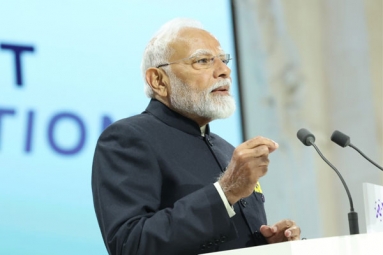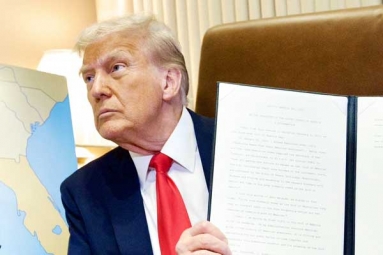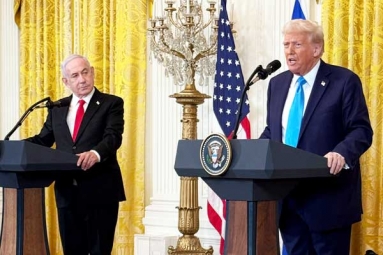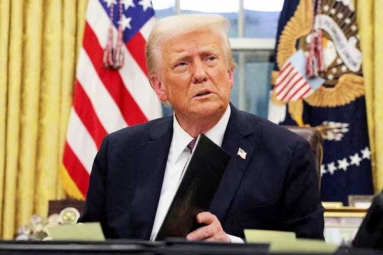‘Stop Terror to Start Talks’: Syed Akbaruddin Calmly Shuts down Pak Journos
August 17, 2019 10:14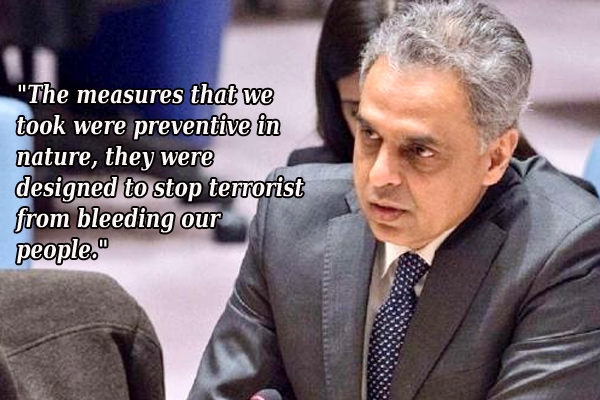
India’s Ambassador and Permanent Representative to the United Nations, Syed Akbaruddin's deed at a press conference after the United Nations Security Council meeting in New York is winning hearts of Indians.
As soon as he started interacting with media persons, Akbaruddin opted to answer the questions by three Pakistani journalists. When one of the journalists asked, “When will you begin a dialogue with Pakistan?” Akbaruddin left his podium and walked up to him and shook hands.
"So, let me start by coming across to you and shaking hands. All three of you."
#WATCH: Syed Akbaruddin, India’s Ambassador to UN says,"so, let me start by coming across to you and shaking hands. All three of you," to a Pakistani journalist when asked,"when will you begin a dialogue with Pakistan?" pic.twitter.com/0s06XAaasl
— ANI (@ANI) August 16, 2019
In addition, while responding to one of the Pakistani journalists question that while he says that talks would take place between India and Pakistan, why has New Delhi closed all road that leads to dialogue, he said: “talks cannot happen while you increase terrorism. Stop terror and we will talk to you,” he said.
‘Entirely Internal Matter’
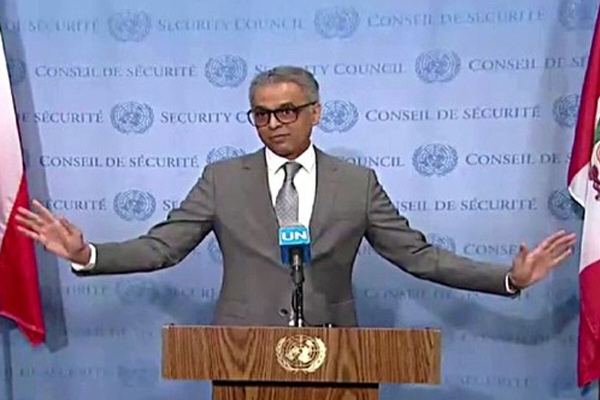 (Image source from: Livemint)
(Image source from: Livemint)
Asked about Pakistan saying that the issue has been internationalized, Akbaruddin said that in close consultations, anyone, especially parties to the dispute, can try and throw in anything for consideration of members of the security council.
"However, you have seen what is the outcome of that meeting. We are ready to address these issues in a manner that states who have normal approaches to international ties should address them. In our case, we are committed to Simla agreement. It is now for Pakistan to make that commitment to stop terror to start talks," he said.
"The recent decisions taken by the Government of India and our legislative bodies are intended to ensure that good governance is promoted, socio-economic development is enhanced for our people in Jammu and Kashmir and Ladakh," he said.
Akbaruddin said the changes internal to India "have not made any difference to our external orientation" and New Delhi remains committed to ensure that the situation remains calm and peaceful.
He said India was committed to all the agreements signed by it on the issue. He also took implied digs at Pakistan and accused it of encouraging cross-border terrorism.
"We note that there were some who tried to project an alarmist approach to the situation which was far from the ground realities. Of particular concern is that one state is using the terminology of jihad against and promoting violence in India including by their leaders," he said.
"Terrorism is being fueled, language and incendiary talk of jihad are being mentioned by people who should know better," he added.
Akbaruddin said the violence was no solution to the problems. "We are committed to and consistent with previous positions that all issues between India and Pakistan as also between Indian and any other country will be resolved bilaterally, peacefully and in a manner which behaves normal inter-state relations between countries. We stand ready to continue our efforts towards a peaceful resolution of all issues in an atmosphere free of terror and violence," he said.
‘Prevention Better Than Cure’
 (Image source from: Hindi News Khabar India TV)
(Image source from: Hindi News Khabar India TV)
Answering a query about restrictions in Jammu and Kashmir, Akbaruddin said prevention is better than cure.
"The measures that we took were preventive in nature, they were designed to stop terrorist from bleeding our people," he said. Akbaruddin said there have been no fatalities in the past 10 days.
"That is because every effort was made to work and ensure that our people in Jammu and Kashmir are not adversely affected in terms of their lives. There are always difficulties (due to) restrictions. We acknowledge that. We are an open society but it is a balance of choice that the administrators on the ground should make and not journalists or diplomats. Please allow the space and time to address these issues. They have controlled the situation. You have seen there is not one fatality," he said.
"In similar situations in large parts of the world, including previously in Jammu and Kashmir, there have been large fatalities if such an issue arises. Give us some time. we are addressing it in a democratic manner. We are committed to addressing difficulties that our people in Jammu and Kashmir are facing," he said.
Asked about human rights violations in Jammu and Kashmir, he said no inter-governmental organization in the world has ever said anything about Indian democracy, India's commitments to human rights.
"We are the country who started issues of apartheid at the UN. India was the country which (worked for) changing the charter of human rights declaration. Our constitution is an open book and if there are any issues these will be addressed by our courts. We do not need international busybodies to try and tell us how to run our lives," he said.
Akbaruddin said Jammu and Kashmir Chief Secretary BVR Subrahmanyam had in the morning announced a whole set of measures that the government is undertaking to move towards normalcy.
"The Security Council at its closed consultations appreciated these efforts, acknowledged them. We are committed to gradually removing all restrictions. You are aware of the time table for that," he said.
"Our national position was and remains that matters related to Article 370 of the Indian Constitution are entirely an internal matter of India. It has no external ramifications," he said.
‘Committed to Simla Agreement’
 (Image source from: Hindustan)
(Image source from: Hindustan)
Answering a query that Article 370 could be an internal matter of India and there were past UNSC resolutions, he said India and Pakistan had signed the Simla accord in 1972.
"We are committed to that and we hope Pakistan too will try to address these issues in the manner that they have signed on to in a legally binding agreement. We stand ready to address them in that context. We can go back in history but every new agreement overtakes the past. We are committed to that agreement and we hope Pakistan too is because if that is so, its actions do not seem to be working out in what is in that agreement," Akbaruddin said.
Asked about Russia saying that it favors a bilateral tract between India and Pakistan on Kashmir and it was also the view of many countries at the UN, Akbaruddin said he will not take on the responsibility of speaking for the council.
"The council has spoken. All of you are aware of what outcomes are. Let me tell you India's commitment to addressing these issues on bilateral tract has very broad acceptance globally", he said.
Who Is Syed Akbaruddin?
 (Image source from: Swarajya)
(Image source from: Swarajya)
Akbaruddin, a senior Indian diplomat, joined the Indian Foreign Service in 1985 and since then, he has represented India's interests in various capacities and promoted friendly ties across the globe.
He was appointed as India's permanent representative to the UN in January 2016, before which he served as the coordinator of the India-Africa summit in 2015.
He also served as the official spokesperson of Ministry of External Affairs January 2012 to April 2015. During this tenure, he reportedly used to work for 7 days a week, that was when MEA's social media presence reached its peak.
By Sowmya Sangam



